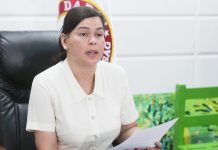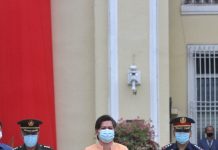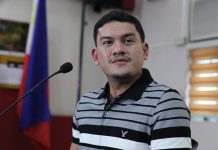by Antonio M. Ajero
PEACE with the National Democratic Front will be achieved in our lifetime.
This is the belief expressed by former Justice secretary Silvestre H. Bello III, the Dabawenyo who was involved in peace negotiations with the communists for a total of 10 years, four years of it as chairman of the government panel.
“I am confident we can achieve a just and lasting peace with the NDF very soon,” Bello said when interviewed in his Makati law office three weeks ago.
Confident of accord signing
“Before my departure from the panel (in December 2004), we were very confident that we could sign a peace agreement in less than a year. At the time, high level na ang pumunta sa Netherlands (where the negotiations were being held).. we already agreed on a time frame… there were already trigger mechanisms adopted that we were hoping that in a span of eight month we could be signing an agreement,” the two-time justice secretary recalled.
Bello, who was in Davao City during his early law practice in the turbulent days of martial rule, takes pride in his decade-long involvement in the peace process, during which the government was able to strike 10 accords with the communists. These include the Comprehensive Agreement on Respect for Human Rights and International Humanitarian Law (Carhrihl), the first of the four substantive agreements that both panels aim to achieve in the peace negotiations for the world’s longest insurgency to end (See list of agreements somewhere on this page.-AMA).
Framework of the talks
“The framework of the talks is that we have four substantive issues,” Bello said. “The first issue is on human rights and international humanitarian law, number 2 is social and economic reforms; the third is political and constitutional reforms.”
“If we can agree on these three issues, the fourth will be the cessation of hostilities and disposition of forces,” he said.
However, the veteran peace negotiator said “we should not delude ourselves into thinking that the solution of the insurgency problem is the signing of the agreement, kasi if there is still poverty, there is still injustice and people in government are still corrupt, marami pa ring disipulo ang mga dissidents..”
Strategic, tactical value
Bello explained that the peace negotiation has both tactical and strategic value.
“While we are talking, the expectation is that the shooting is reduced, he said. “More talking, less shooting, that’s the tactical value,” he added.
The strategic value, Bello said, is that while you are negotiating, you are supposed to address the root causes of the armed conflict.
“As established by the National Unification Commission headed by the late Prof. Haydee Yorac, the root causes are extreme poverty of the people, injustice and corruption in government,” he said.
Bello quoted NDF consultant Jose M. Sison as saying “peace talks like these would not be needed, if you just render us irrelevant. Kung walang mahirap, sino’ng magdyo-join ng NPA (New People’s Army), kung walang victim ng injustice, sino ang magdyo-join sa NPA, kung ang government is a clean and honest government, sino’ng magdyo-join sa amin? We are the alternative to corruption, alternative to injustice and the alternative to poverty…”
Negotiation dynamics
Bello also ask people to understand why it is taking the talks a long time to achieve an agreement.
He said that sometimes the NDF negotiators are very stringent in their demands, “pero alam namin (in the government panel) na yan ay part of negotiating skills.”
There were times when just one word which the panels could not agree on would stall the talks for days.
“This happened even after we had already agreed on the whole paragraph,” Bello said.
“Sasabihin ng NDF, we ask for a few minutes recess.. those few minutes would become three hours. Then, we also had a chance to ask for a few minutes break.. this was also our opportunity to delay returning to the negotiation table… hahaha. Sometimes, one party would wonder why the other panel quickly returned to the talks. That is all part of the negotiation dynamics,” he said.
FVR lauded
Bello considers his stint with the panel most remarkable during the presidency of Fidel V. Ramos.
He said that FVR saw to it that the peace process moved forward.
“His strict instruction was never to suspend, never to cause a stalemate in the talks… proceed if there are difficult questions,” Bello recalled.
“Ang usapan noon .. kung meron tayong hindi
pagkakaintindihan.. iwanan muna natin yan. (The tacit agreement then was that if there was a point of disagreement…let’s leave it first..). We proceeded to issues where we could agree.. so we could move forward,” he said.
High hopes with Rody
Bello said that he is confident the talks will resume very soon, especially with Vice Mayor Rodrigo R. Duterte’s acceptance to be the NDF’s resource person.
Is VM Rody’s acceptance as NDF consultant good for him? Good for the country? Good for his politics?
“Good for the peace process,” Bello said.
“I’m sure that Mayor (Rody) Duterte knows the issues and probably he has the answers to these issues. I would not be surprised if he has some solutions, that’s why he is a big help to the peace process,” the former peace negotiator said.
Other prominent persons who acted as consultants to the peace talks included former Senate President Franklin Drilon, former senator now congressman Rodolfo Biazon and Fr. Joaquin Bernas, among others. [AMA]






